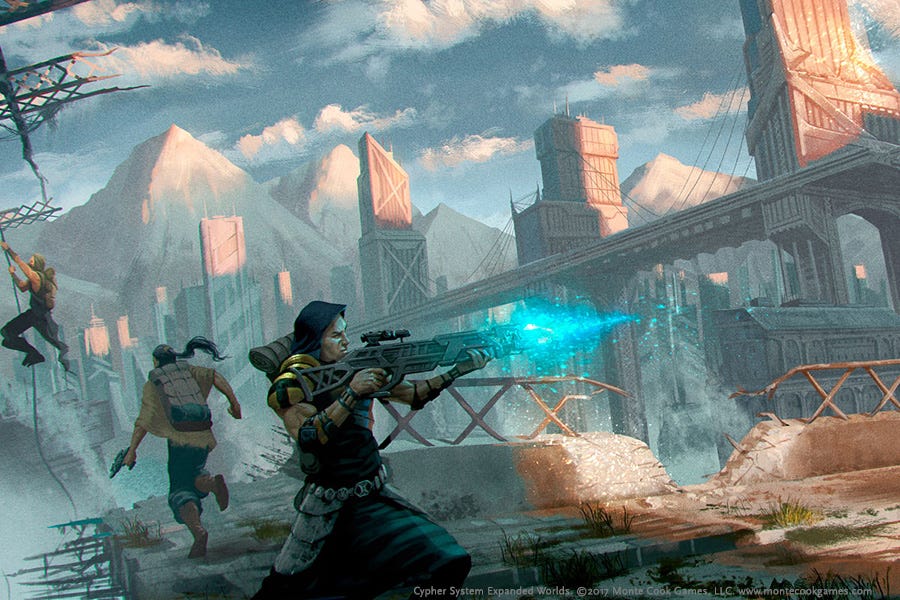It's Right There in the Name
The game is called Cypher, so if we’re monkeying with the rules, we’d better make sure that cyphers work in the game, and work really well.
A common observation from players is that the concept of cyphers works well in some genres, but not others. In fantasy, for example, they’re potions and scrolls and whatnot. But in a modern game, what are they?
We’ve had answers to that question over the years, but I decided to explore those answers and basically rebuild cyphers from the ground up.
Cyphers are abilities that your character has that change. The goal of including cyphers is to spice up the game, so that the players can pull out something surprising to make an encounter or a situation more interesting. In other games, you might deal with the same challenge the same way every time, but with cyphers, you’ve got different tricks up your sleeves. You’re on an alien planet with weird monsters that attack again and again. Sure, your warrior can shoot the monster each time, but what if the second time, they’ve got the ability to ask the GM a question about the beast to get more intel? What if one of those times, they can foil the monster’s main attack and drive it away? Or stun it long enough that their allies can make short work of it? Those are all very different encounters, and it’s you, the player, not the GM, making them different.
So we took a concept called subtle cyphers and highlighted it. A subtle cypher isn’t a potion or a device. It’s a sudden burst of insight, so a character can best utilize the conditions around them. It’s a surge of adrenaline or a second wind. It’s luck. It’s all those things that go into stories that are so very difficult to mechanize in a game.
These kinds of cyphers all offer abilities that don’t need the supernatural to explain them. Even a character in a James Bond-style espionage game can use one to regain points to a Pool, get a one-time boost to a task, or gain a momentary bit of inspiration (mechanically represented by asking the GM a question). There are many different cyphers, and while none of them are going to break the game, they’re going to be useful and interesting.
Cyphers are the things a character can use to seize the moment and take advantage of something that isn’t a long-practiced skill or an ability they’ve trained themselves to use (though they have those too, of course, and can always rely on them). In other words, a character’s got a bunch of stuff on their character sheet they can consistently rely on, and then a couple of “wild cards” that change from time to time. These keep the game from ever getting stale, and they ensure that everyone’s got something special and different to do.
And every time a character rests significantly (as in, an hour or more of narrative time), they can get more cyphers to use, so players are encouraged to use them.
This is the default way cyphers operate in the game. The idea that cyphers are physical objects is the exception, not the rule, used in genres where they are appropriate. These are called manifest cyphers, and characters can have a mixture of the two kinds.
Manifest cyphers are more dramatic. They make things explode, cause them to shrink down to a tenth their size, or conjure magical power that imbues a weapon. In a game where there’s magic at work, ultratech at play, or any kind of special weird devices, they offer interesting alternative options and again, give characters capabilities that go against “type,” so a fighter can read someone’s mind, or a star pilot can heal their friend’s wound. Manifest cyphers can absolutely turn the tide of a single encounter or save a PC’s life if used well. They grant powers that almost certainly require some kind of supernatural or high-tech to explain, but the majority of genres allow for such things if you want them to.
We’ve also organized cypher effects into categories of power, reflected with cypher levels.. One cool thing about this is that characters that can make cyphers—whether a witch brewing potions or a tech cobbling together a jury-rigged device—have useful and meaningful guidelines for how powerful the cypher should be.
There are even ways a spellcasting character can draw upon these cypher categories to choose a specific cypher to cast as a spell (and remember, with genre abilities, anyone in a fantasy game can become a spellcaster—at least a little—if they want to).
Overall, by reworking and recategorizing cyphers, we’ve made it even easier to reflect abilities (supernatural or not) in different settings. And since both cyphers and differing settings are at the core of the game, it just makes sense.


Hello, Antonio Trapero here, long time fan.
Problem with subtle cyphers, imho, was the random nature about how they are presented in the different books. Its not bad for game start or rests, but some quick generation rules for the GM to create them based in the narrative would be great.
I struggle with physical cyphers as a gm. I don't like them, I guess, on a personal level. They are commodities for me. I prefer ephemeral abilities that come and go. Perhaps curated to each character, and assembled with the help of that player so that they aren't blessed with something they feel off-brand.